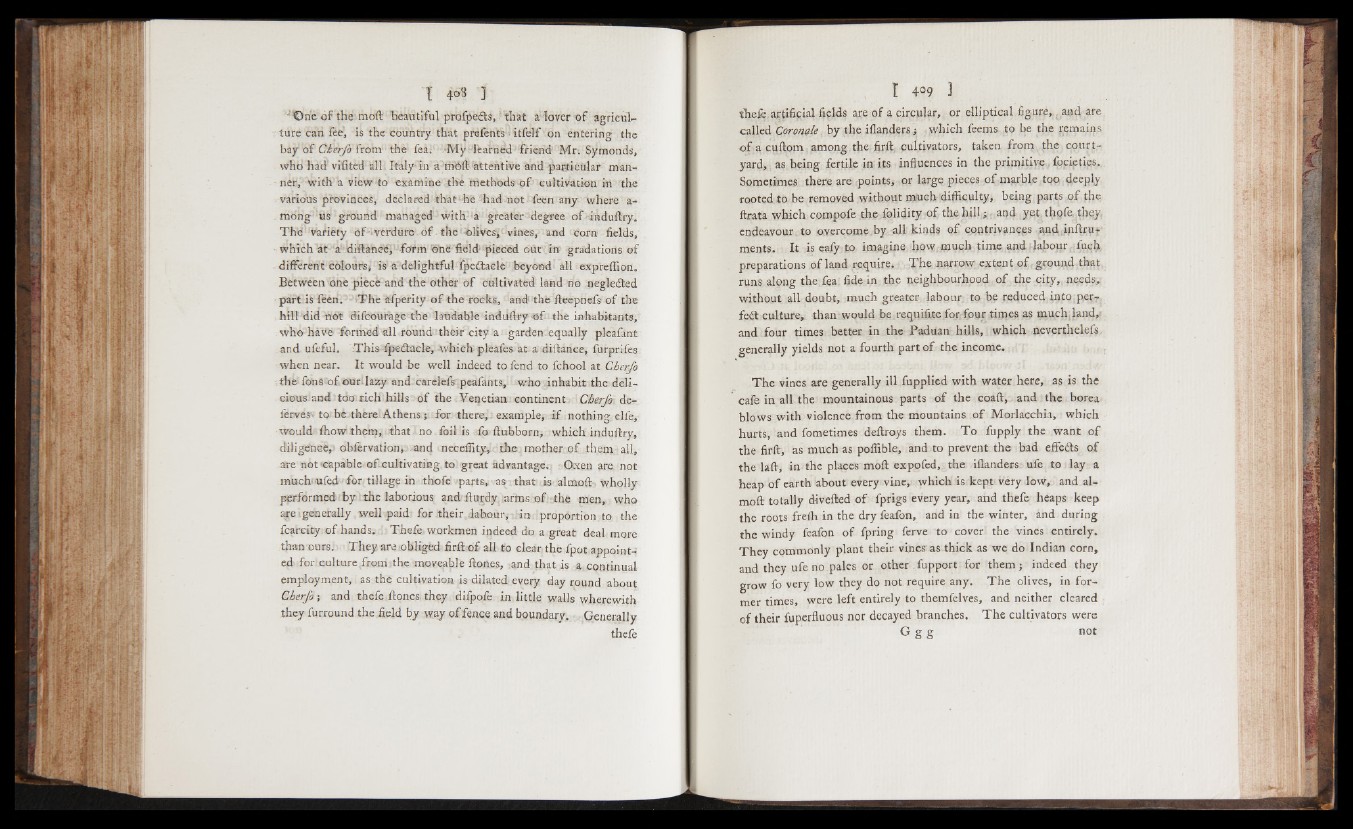
© rie o f the moft: beautiful profpeits, 1 that a lover o f agriculture
can fee, is the country that prefents : itfelf on entering the
bay o f Cterfo {rom the fea.' My learned friend Mr; Symonds,
who had' vifited all Italy- in a môft attentive and particular manner,
with a view to examine the methods of' cultivation in the
various provinces, declared that‘ he had not feen any where a-
mong us ground managed with a greater degree o f induftry.
The ' variety o f verdure o f th e 1 OlivesT- vines, and corn fields,
which at a diftaneë, .fctfm one field’ pieced ofit in gradations of
diffèrent colours, is: a delightful fpedtacle beyond all exprelfion.
Between one piece and the other o f cultivated land no negleited
part is feen. The âfperity o f the rocks, and the ileepnefs of the
hill did not difcourage the laudable induftry >of the inhabitants,
who have formed all round their city a garden.equally pleafânt
and ufeful. This fpedtacle, which- pleafes at a didance, furprifes
when near. It would be well indeed to fend to fchool at Cherfo
the fons o£our lazy and carelefs peafants, who inhabit the delicious
and trio rich hills o f the Venetian continent. Cherfo de-
lèrves. to be there Athens ; for there, , example, i f ; nothing, elfe,
would fhow them, that no foil is fa ftubborn, which induftry,
diligence,: obfervation, and neceffity, the mother o f them all,
are not'capable o f cultivating to great advantage. Oxen are not
much’ufed for tillage in thofe parts., as that is al moft-, wholly
performed by i the laborious and ilurdy artns o f the men, who
aye'generally well paid-for their.labour, : in proportion to the
fcarcity o f hands.fe; Thefe, workmen indeed do a.great deal more
than ours. They are .obliged firftof all to clear the fpot appointed
for culture(from the ¡moveable ftones, and that is a, continual
employment, as the cultivation is dilated every day round about
Cherfo ; and thefe ftpnes. they difpofe in little walls wherewith
they furround the field by way o f fence and boundary. Generally
thefe
thefe.aftifipial fields are of a circular, or elliptical figure, . and at®
called Coromle. by the illanders ■, which feems ¡to be the remains
o f a cuftom among the firit, cultivators, taken from, the courtyard,
as being fertile in its influences in the primitive, fepfeties.
Sometimes there are points, or large pieces ,of marble too deeply
rooted to be removed without much-difficulty, being parts o f the
ftrata which compofe the falidity o f the h ill; and yet thofe they,
endeavour , to overcome by all kinds o f contrivances $nd inftrui-
ments. It ,is eafy to imagine hpw much time and flavour fueh
preparations of land require. The narrow extent o f ground that
runs along the,fea. fide in the neighbourhood o f the c ity , needs;,
without all doubt, much greater labour to be reduced into perfect
culture, than would be requifite for four times as much land,
and four times better in the Paduan hills, which neverthelefs
generally yields not a fourth part o f the income.
The vines are generally ill fupplied with water here, as is the
cafe in all the mountainous parts o f the coaft, and the borea
blows with violence from the mountains o f Morlacchia, which
hurts, and fometimes deftroys them. T o fupply the want o f
the firft, as much as poffible, and to prevent the bad effeits o f
the laft, in the places moft expofed, the illanders ufe to lay a
heap of earth about every vine, which is kept very low, and almoft
totally divefted o f fprigs every year, and thefe heaps keep
the roots frefh in the dry feafon, and in the winter, and during
the windy feafon of fpring ferve to cover the vines ¡ entirely.
They commonly plant their vines as thick as we do Indian corn,
and they ufe no pales or other fupport for them; indeed they
grow fo very low they do not, require any. The olives, in former
times, were left entirely to themfelves, and neither cleared
of their fuperfluous nor decayed branches. The cultivators were
G g g not